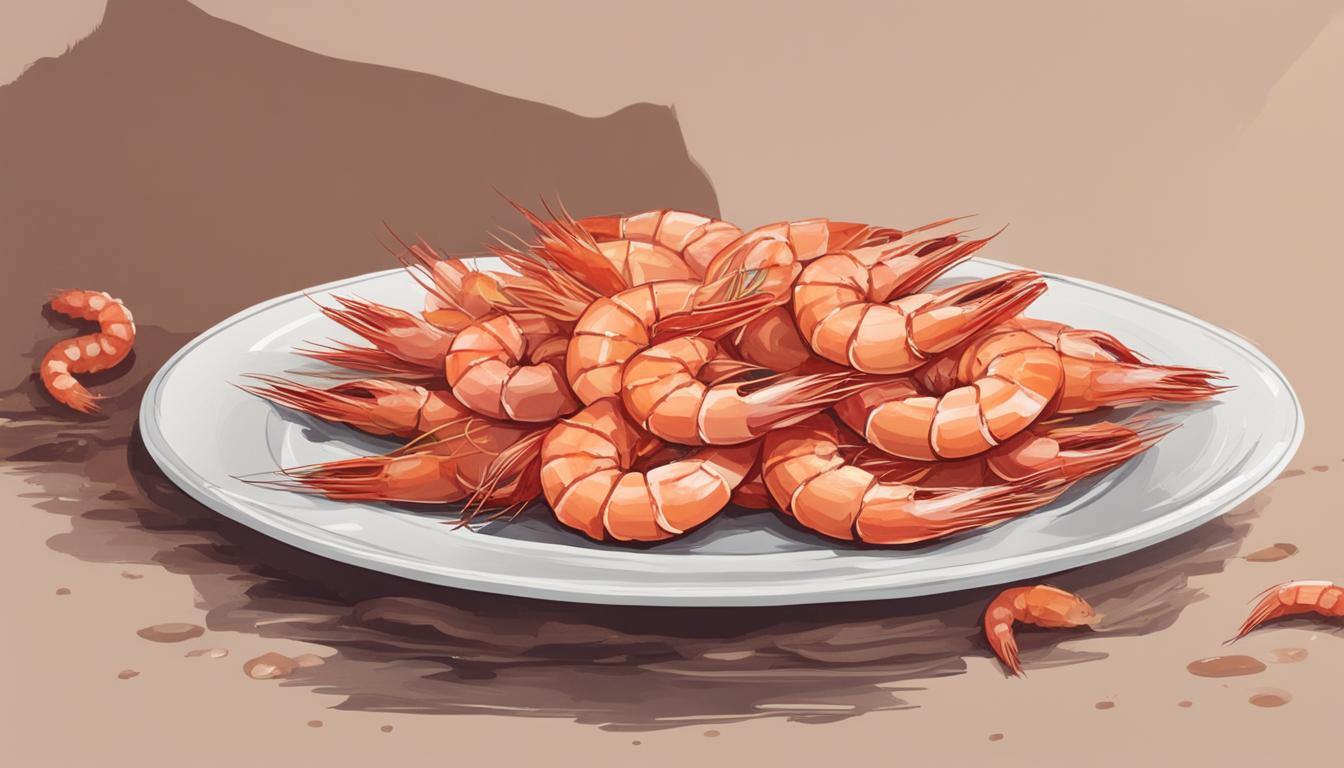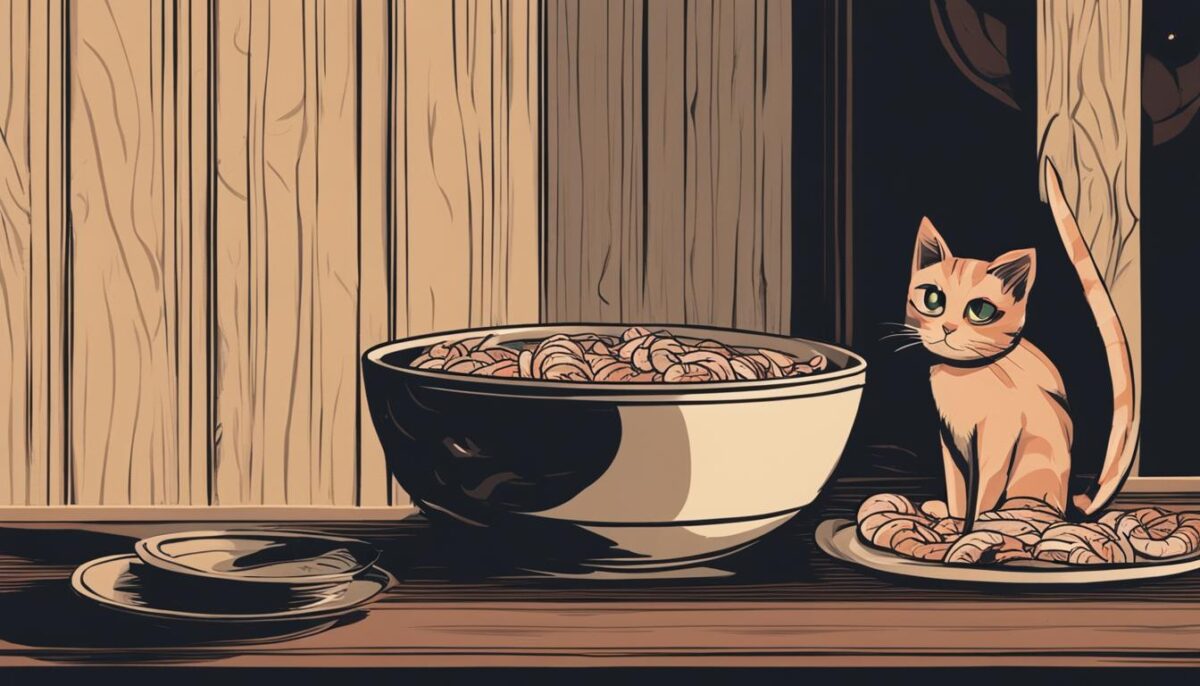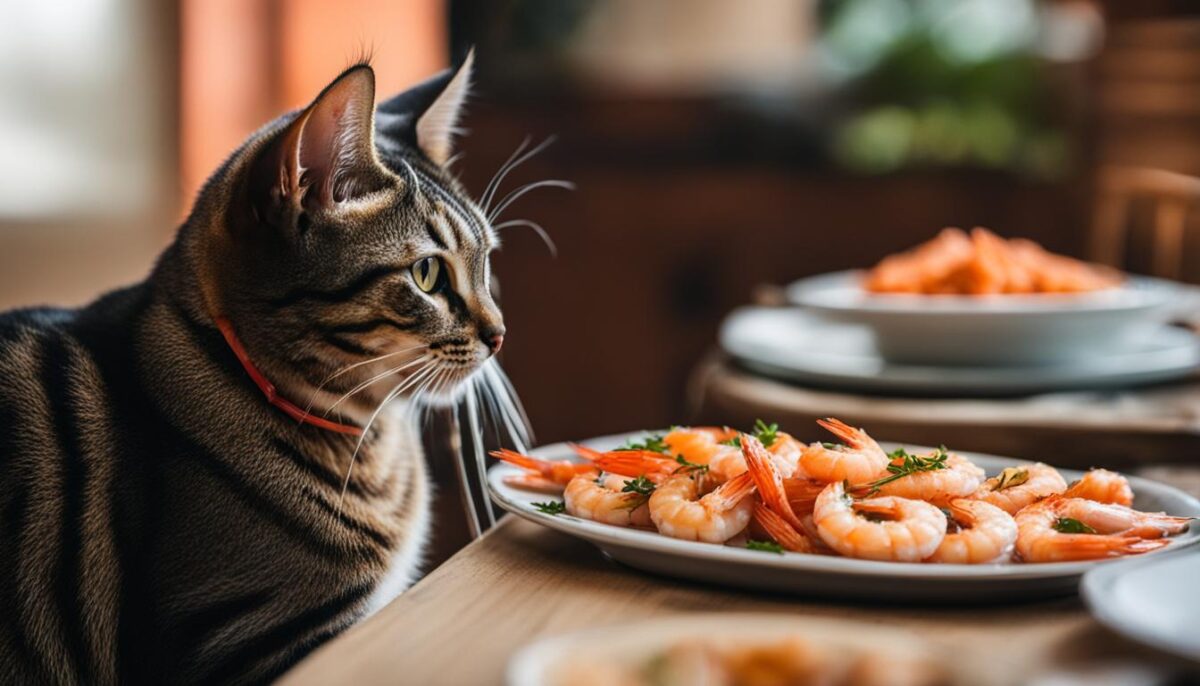Can cats eat shrimp? It’s a question that many cat owners ponder. After all, who wouldn’t want to share their favorite seafood with their feline friend? But before you do, it’s important to consider the implications for your cat’s diet and overall health.
Shrimp can be a tempting treat for cats, but is it safe for them to indulge? Let’s explore the topic and find out if cats and shrimp are a purrfect pairing.
Key Takeaways:
- Cats can eat shrimp in moderation, but it’s important to consider their individual sensitivities and dietary needs.
- Shrimp can provide a source of lean protein and essential nutrients for cats.
- Always serve shrimp to cats without any seasonings, butter, or oils.
- Shrimp should only be given as an occasional treat or supplement to a balanced cat food diet.
- Consult with your veterinarian for personalized dietary recommendations for your feline companion.
The Safety of Shrimp for Cats
Shrimp can be a safe and enjoyable treat for your cat, but it’s important to consider a few factors before introducing it into their diet. Just like humans, some cats may have allergies or sensitivities to shrimp. Therefore, it’s crucial to proceed with caution and start by offering a small amount to see how your cat reacts.
When feeding shrimp to your cat, it’s essential to remove the shell, tail, and any small bones. These can pose a choking hazard and cause digestive issues. Additionally, avoid serving shrimp with any seasonings, butter, or oils, as they can be harmful to your cat’s digestive system.
While shrimp can provide cats with a source of protein and essential nutrients, it should only be given in moderation as an occasional treat or supplement to their regular cat food. It’s important to ensure that your cat’s primary source of nutrition comes from a balanced diet specifically formulated for feline needs.
| Benefits of Shrimp for Cats | Risks of Shrimp for Cats |
|---|---|
|
|
Remember, consult with your veterinarian before making any significant changes to your cat’s diet. They can provide personalized recommendations based on your cat’s specific needs and ensure their overall health and well-being. Enjoy sharing shrimp with your feline friend, but always prioritize their safety and nutritional requirements.
Shrimp as a Dietary Supplement for Cats
Shrimp can be a beneficial dietary supplement for cats. It is a good source of lean protein and contains essential amino acids that contribute to feline nutrition. Shrimp also contains Omega-3 fatty acids, which are beneficial for cats’ skin, coat, and overall health. However, it’s important to remember that cats are obligate carnivores, meaning their primary source of nutrition should come from animal protein. Shrimp should only be given as an occasional treat or supplement to a balanced cat food diet.
The Health Benefits of Shrimp for Cats
Feeding cats shrimp can provide several health benefits. The lean protein found in shrimp helps support muscle development and maintenance in cats. Additionally, the Omega-3 fatty acids in shrimp can contribute to healthy skin and a shiny coat. These fatty acids also have anti-inflammatory properties that can benefit cats with arthritis or joint issues. However, it’s crucial to ensure that shrimp is properly prepared and served without any additives or seasonings that may be harmful to cats.
| Health Benefits of Shrimp for Cats | |
|---|---|
| Source of lean protein | Supports muscle development and maintenance |
| Contains Omega-3 fatty acids | Contributes to healthy skin and coat |
| Anti-inflammatory properties | Beneficial for cats with arthritis or joint issues |
When offering shrimp to your cat, it’s important to keep portion sizes small and infrequent. Remember that cats have specific dietary requirements, and their primary source of nutrition should be a balanced cat food diet. Shrimp should never replace a complete and balanced cat food but should be given as an occasional supplement or treat. Always consult with your veterinarian for personalized dietary recommendations for your feline companion.
Can Kittens Eat Shrimp?
Shrimp can be a tasty treat for humans, but can kittens enjoy this seafood delight as well? While adult cats can safely consume shrimp in moderation, it’s not recommended to feed shrimp to kittens. Kittens have specific dietary needs that differ from adult cats, and their bodies are still developing, making them more susceptible to digestive issues and potential allergic reactions. Therefore, it’s best to stick to age-appropriate cat food for kittens to ensure they receive all the necessary nutrients for their growth and development.
Kittens require a balanced diet that provides the right balance of protein, fats, and carbohydrates. This helps support their rapid growth and provides them with the energy they need to explore their surroundings and play. Commercial kitten-specific cat food formulations are specifically designed to meet these nutritional needs. They provide the essential vitamins, minerals, and amino acids kittens require for optimal health and development. Feeding kittens a well-rounded kitten food diet ensures they receive all the nutrients they need without the potential risks associated with introducing unfamiliar foods like shrimp.
The Importance of a Balanced Kitten Diet
A balanced kitten diet is critical for their overall health and well-being. Kittens need a high-quality kitten food that includes a variety of animal protein sources, such as chicken or fish. These proteins provide the necessary building blocks for muscle development and support the growth of strong bones and teeth. Additionally, kitten food should contain optimal levels of fat, which is a concentrated source of energy and aids in the absorption of fat-soluble vitamins.
It’s important to note that feeding kittens a diet primarily consisting of shrimp or any other single food item can lead to nutritional imbalances. Variety is key in providing kittens with a wide range of nutrients. Therefore, it’s best to consult with your veterinarian for personalized dietary recommendations for your kitten based on their breed, age, and specific health needs.
| Kitten Diet Requirements | Benefit |
|---|---|
| Protein | Supports muscle development and growth |
| Fat | Provides energy and aids in nutrient absorption |
| Carbohydrates | Provide energy and aid in digestion |
| Vitamins and Minerals | Necessary for overall health and well-being |
In conclusion, while adult cats can enjoy the occasional serving of shrimp, it’s best to refrain from feeding shrimp to kittens. Kittens require a balanced diet specifically formulated for their growth and development. Commercial kitten food provides the necessary nutrients to support their health and ensure they receive the right balance of proteins, fats, and carbohydrates. By prioritizing a well-rounded kitten diet, you can help your furry friend thrive during their early months and set them up for a healthy adult life.
Remember, always consult with your veterinarian for personalized dietary recommendations and guidance regarding your kitten’s specific needs.
Risks of Feeding Cats Shrimp
While shrimp can be a tempting treat for your feline friend, there are some risks you should be aware of before feeding it to them. One of the main concerns is the potential for allergies or sensitivities. Just like humans, cats can develop adverse reactions to certain foods, including shrimp. It’s important to introduce shrimp to your cat’s diet gradually and keep an eye out for any signs of digestive issues or allergic reactions.
In addition to allergies, there is also a choking hazard associated with feeding cats shrimp. The shells, tails, and even small bones can pose a risk if ingested. It’s crucial to remove these parts before offering shrimp to your cat and always supervise them while they eat. Ensuring that the shrimp is properly prepared and served can help mitigate this potential danger.
To summarize, the risks of feeding cats shrimp include the possibility of allergies or sensitivities and the choking hazard presented by the shells, tails, and bones. It’s important to be cautious when introducing shrimp to your cat’s diet and to monitor their reaction closely. If you have any concerns or questions, it’s always best to consult with your veterinarian for personalized advice.
Table: Potential Risks of Feeding Cats Shrimp
| Risks | Precautions |
|---|---|
| Allergies or sensitivities | Introduce shrimp gradually and observe for adverse reactions |
| Choking hazard (shells, tails, bones) | Remove these parts before offering shrimp and supervise your cat while they eat |
“It’s important to be cautious when introducing shrimp to your cat’s diet and to monitor their reaction closely.” – Dr. Lisa Collins, Veterinarian
Alternative Seafood Options for Cats
While shrimp can be a tasty and nutritious treat for cats, it’s always good to have a variety of options to keep their diet interesting. Here are some alternative seafood choices that you can consider for your feline friend:
- Cooked Fish: Fish like salmon and tuna can be a great source of protein for cats. These fish are often found in commercial cat food formulations and are specifically designed to meet feline nutritional needs. Just like with shrimp, it’s important to prepare and serve the fish without any seasonings, oils, or additives that can be harmful to your cat’s health.
- Sardines: Sardines are another cat-friendly seafood option. They are rich in omega-3 fatty acids, which can support your cat’s skin, coat, and overall health. When feeding sardines to your cat, make sure to remove any bones and serve them in small portions.
- Mackerel: Mackerel is a fatty fish that can provide a good source of omega-3 fatty acids for your cat. It’s important to note that mackerel should be given as an occasional treat due to its higher fat content.
When introducing any new food to your cat’s diet, it’s important to do so gradually and observe for any adverse reactions. Always consult with your veterinarian for personalized dietary recommendations based on your cat’s specific needs.
Remember, while seafood can be a healthy addition to your cat’s diet, it should always be served in moderation and as part of a balanced cat food diet. A well-rounded cat food that meets all of your cat’s nutritional needs should always be the main component of their diet. By offering a variety of cat-friendly seafood options like shrimp, fish, sardines, and mackerel, you can keep your feline friend happy and satisfied while ensuring their overall health and well-being.
Next, we’ll discuss the importance of a balanced cat diet and how it contributes to your cat’s overall health and longevity.
The Importance of a Balanced Cat Diet
When it comes to your cat’s diet, balance is key. While it can be tempting to share a taste of shrimp or other seafood with your feline friend, it’s important to remember that a balanced cat diet should primarily consist of high-quality, commercial cat food. These specially formulated cat foods are designed to provide all the necessary nutrients to meet your cat’s specific dietary requirements.
Feeding your cat a well-balanced diet ensures their overall health and well-being. Commercial cat foods are carefully crafted to provide the right combination of proteins, fats, carbohydrates, vitamins, and minerals that your cat needs for optimal nutrition. They are also formulated to meet the specific needs of cats at different life stages, such as kittens, adults, and seniors.
While occasional treats like shrimp can be enjoyed by your cat, they should not replace the mainstay of their diet – high-quality cat food. It’s important to remember that cats are obligate carnivores, meaning their bodies are designed to thrive on animal protein. A balanced cat diet ensures that your cat receives the essential amino acids, vitamins, and minerals they need to maintain a healthy body, strong immune system, and shiny coat.
| Essential Nutrients for Cats | Role in Cat’s Health |
|---|---|
| Protein | Builds and repairs tissues, supports growth and development |
| Taurine | Essential for heart health, vision, and reproductive function |
| Omega-3 Fatty Acids | Promote healthy skin and coat, support joint health and cognitive function |
| Vitamins (A, D, E, B-complex) | Play important roles in various bodily functions |
| Minerals (calcium, phosphorus, magnesium, etc.) | Support bone health, muscle function, and overall metabolism |
Maintaining a balanced cat diet not only supports your cat’s physical health but also helps prevent common feline health issues like obesity, urinary tract problems, and dental disease. It’s important to consult with your veterinarian to determine the best cat food option for your furry friend based on their specific needs, age, activity level, and any underlying health conditions.
Conclusion
In conclusion, cats can eat shrimp in moderation, but it’s important to consider their individual sensitivities and dietary needs. Shrimp can provide a source of lean protein and essential nutrients, but it should only be a part of a balanced cat diet. Always serve shrimp without any additives and supervise your cat while they are eating. Remember to consult with your veterinarian for personalized dietary recommendations for your feline companion.
FAQ
Can cats eat shrimp?
Yes, cats can eat shrimp in moderation. However, it’s important to consider their individual sensitivities and dietary needs.
Is shrimp safe for cats to eat?
Shrimp can be safe for cats to eat, but it’s crucial to introduce it gradually and observe for any adverse reactions. Some cats may have allergies or sensitivities to shrimp, just like humans.
Can cats have shrimp as a dietary supplement?
Yes, shrimp can be a beneficial dietary supplement for cats. It provides a source of lean protein, essential amino acids, and Omega-3 fatty acids, which are beneficial for their skin, coat, and overall health.
Can kittens eat shrimp?
It is not recommended to feed shrimp to kittens. Their bodies are still developing, and their digestive systems may not tolerate shrimp as well as adult cats. Stick to age-appropriate cat food for kittens.
What are the risks of feeding cats shrimp?
Some cats may have allergies or sensitivities to shrimp, leading to digestive issues or allergic reactions. Additionally, if shrimp is not prepared and served properly, it can pose a choking hazard for cats.
What are alternative seafood options for cats?
Cooked fish like salmon and tuna can be other cat-friendly seafood options. These fish are often found in commercial cat food formulations and meet feline nutritional needs.
How important is a balanced cat diet?
A balanced cat diet is crucial for their overall health and well-being. High-quality, commercial cat food provides all the necessary nutrients and meets their specific dietary requirements.
Can I give my cat shrimp as a regular part of their diet?
Shrimp should only be given as an occasional treat or supplement to a balanced cat food diet. Cats are obligate carnivores, and their primary source of nutrition should come from animal protein.


